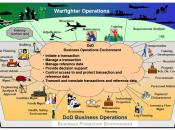The purpose of this paper is to you explain how marketing differs on a business-to-consumer e-commerce as compared to a business to business e-commerce. Additionally, present broad coverage of the e-commerce Marketing trends that have been shaping business-to-business and business-to-consumer e-commerce over the past few years, and also examine what to expect in the future.
Many organizations use strategic alliances, partnerships, and long-term contracts to create relationships with other companies in the marketing of products that they manufacture or sell. They can use the Web to complement their business strategies and improve their competitive positions, ultimately enhancing existing marketing programs.
Continued strong growth in online advertising documents that an increasing number of advertisers and marketers see the Internet is an essential brand-building component in their media planning," said Peter Petrusky, advisory director of PricewaterhouseCoopers(Internet Ad Spend Broke Records in 2005: IAB). "The Internet delivers the right audience at the right time-a winning combination for all types of marketers.
We expect to see continues growth in Internet advertising spendBusiness-to-consumer e-commerce specifically caters to a group or target consumer in order to expose, sell, market etc. goods or services to the public. Examples: Amazon.com, ebay.com, Walmart.com, Borders.com, basically anything offering a retail product to the public in the form of a virtual store.
Many large scale Business-to-consumer e-commerce providers are using Customer Relationship Management (CRM) software to obtain data from operations software that conducts activities such as sales automation, customer service center operations, and marketing campaigns (Electronic Commerce: The Second Wave pg 386). The software must also gather data about customer activities on the company's Web site and any other points of contact the company has with its existing and potential customers. CRM software uses this data to help managers conduct analytical activities, such as gathering business intelligence, planning marketing strategies, customer...


